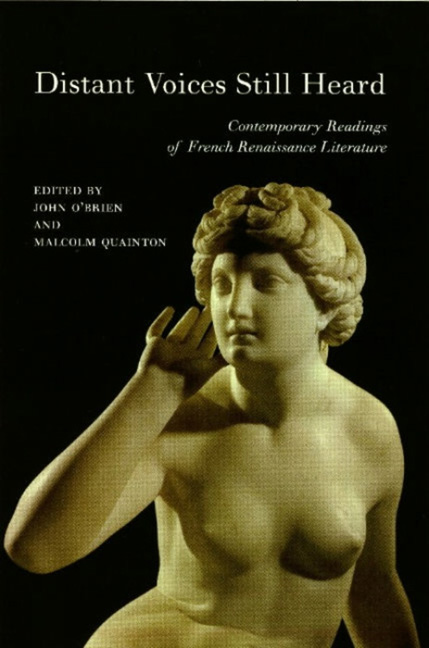Book contents
- Frontmatter
- Contents
- Editors’ Foreword
- Introduction: The Time of Theory
- 1 The Highs and Lows of Structuralist Reading: Rabelais, Pantagruel, chapters 10—13
- 2 Rabelais’ Strength and the Pitfalls of Methodology: Tiers Livre, chapters 7–18
- 3 ‘Blond chef, grande conqueste’: Feminist Theories of the Gaze, the blason anatomique and Louise Labé's Sonnet 6
- 4 Louise Labé's Feminist Poetics
- 5 Reading and Writing in the Tenth Story of the Heptaméron
- 6 Fetishism and Storytelling in Nouvelle 57 of Marguerite de Navarre's Heptaméron
- 7 Creative Choreography: Intertextual Dancing in Ronsard's Sonnets pour Hélène: II, 30
- 8 An Overshadowed Valediction: Ronsard's Dedicatory Epistle to Villeroy
- 9 ‘De l'amitié’ (Essais 1.28): ‘Luy’ and ‘Moy’
- 10 Montaigne's Death Sentences: Narrative and Subjectivity in ‘De la diversion’ (Essais 3.4)
- Select Bibliography
- Index
5 - Reading and Writing in the Tenth Story of the Heptaméron
- Frontmatter
- Contents
- Editors’ Foreword
- Introduction: The Time of Theory
- 1 The Highs and Lows of Structuralist Reading: Rabelais, Pantagruel, chapters 10—13
- 2 Rabelais’ Strength and the Pitfalls of Methodology: Tiers Livre, chapters 7–18
- 3 ‘Blond chef, grande conqueste’: Feminist Theories of the Gaze, the blason anatomique and Louise Labé's Sonnet 6
- 4 Louise Labé's Feminist Poetics
- 5 Reading and Writing in the Tenth Story of the Heptaméron
- 6 Fetishism and Storytelling in Nouvelle 57 of Marguerite de Navarre's Heptaméron
- 7 Creative Choreography: Intertextual Dancing in Ronsard's Sonnets pour Hélène: II, 30
- 8 An Overshadowed Valediction: Ronsard's Dedicatory Epistle to Villeroy
- 9 ‘De l'amitié’ (Essais 1.28): ‘Luy’ and ‘Moy’
- 10 Montaigne's Death Sentences: Narrative and Subjectivity in ‘De la diversion’ (Essais 3.4)
- Select Bibliography
- Index
Summary
In privileging the concepts of écriture and lecture, contemporary theorists have diverted attention from the author as source and the work as object, focusing it instead on writing as a version of the speech act and reading as a subjective activity. When the meaning of a work is seen as the reader's distinctive experience of it, the authority of the author and work is subverted and assumed by the reader. Reading and writing are viewed in this perspective as correlative phenomena, the one participating in the fulfilment and determinacy of the other.
A similar complicity between reader and work seems to obtain in the Heptaméron. From the beginning, Marguerite de Navarre abdicates her status as author, first of all through explicit anonymity, inasmuch as the work was originally published without her name, then by displacement, in relinquishing the role of narrator and commentator to others. Not only do the devisants narrate the stories, they interpret them as well, reading them according to their own perceptions and prejudices.
The immediate effect of Marguerite's absence from the text is to defer meaning in a play of differences. But this effect, contrary to modern expectations, contributes directly and indirectly to the process of ordering and constructing meaning. Directly, when we react, negatively or positively, to a particular reading by a particular devisant; indirectly when, confronted with a series of conflicting readings, we turn back to the story itself, reading it retroactively in an attempt to reconcile the differences arising from their discussion. While Parlamente tells the story of Floride and Amadour, Marguerite writes it, and it is her writing finally which circumscribes and defines its meaning.
- Type
- Chapter
- Information
- Distant Voices Still HeardContemporary Readings of French Renaissance Literature, pp. 123 - 137Publisher: Liverpool University PressPrint publication year: 2000



